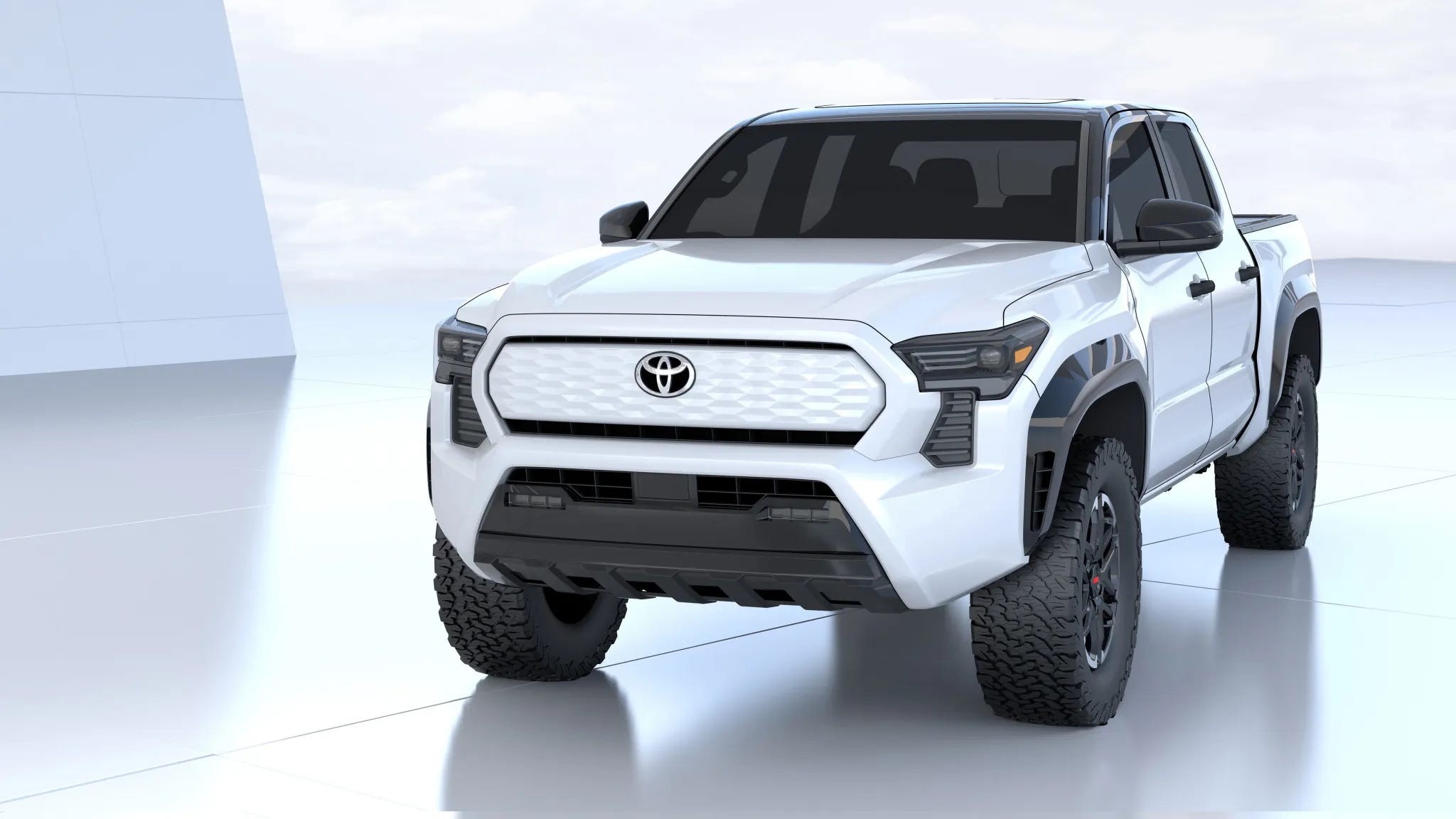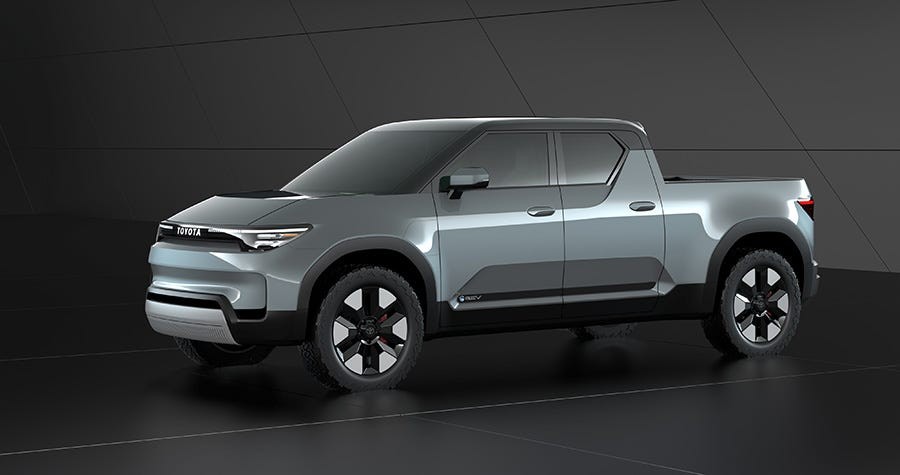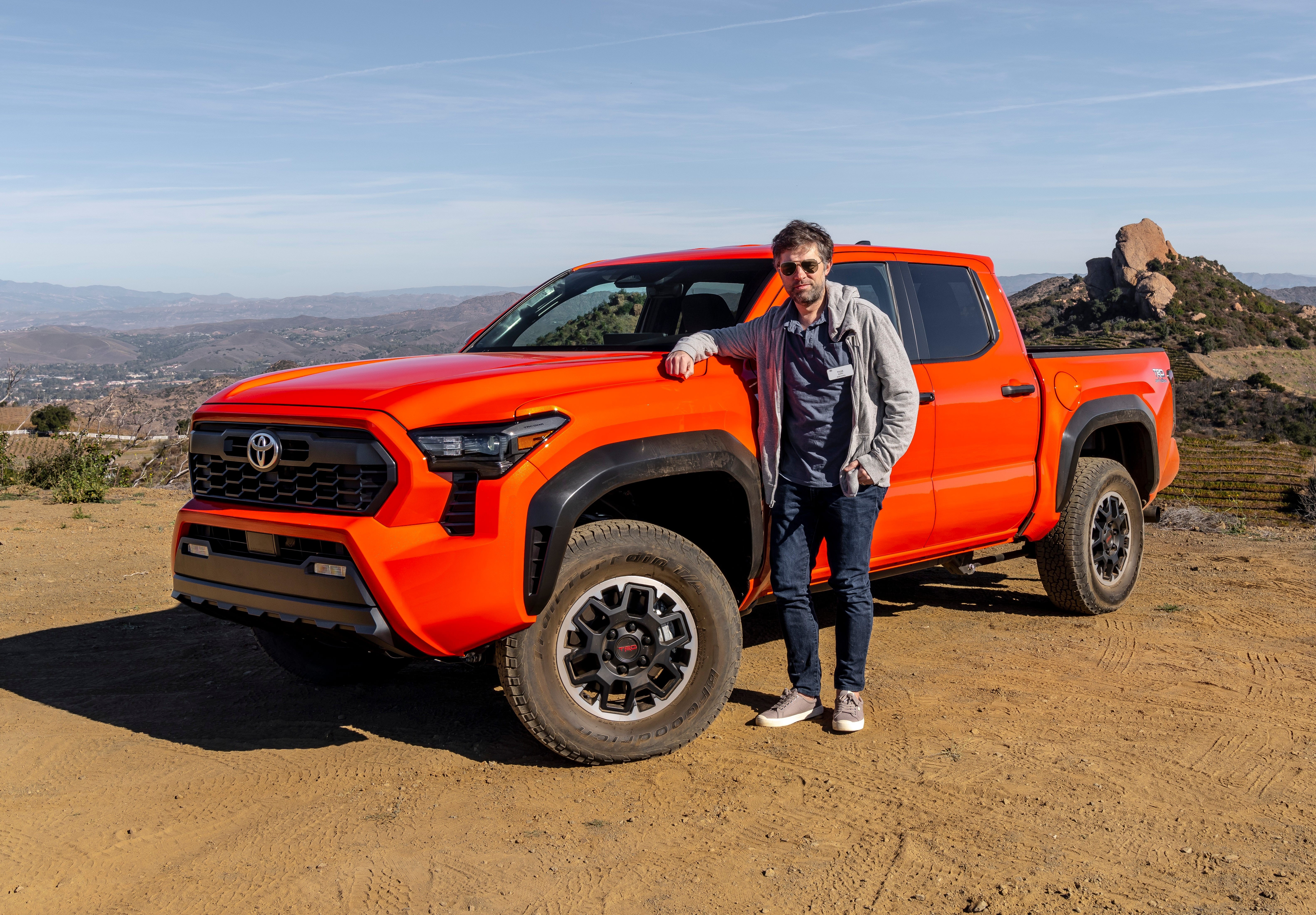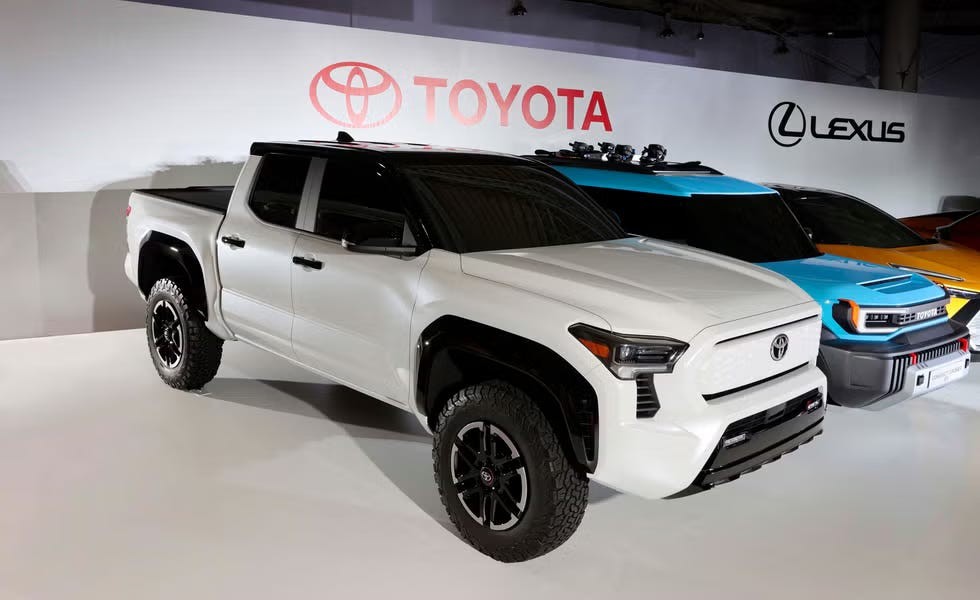The Toyota Tacoma has cemented its place as a cornerstone of the American automotive scene. Its blend of simplicity, adaptability, and off-road prowess, packaged in a reasonably sized truck, exudes an undeniable coolness that many competitors strive to emulate. Furthermore, the Tacoma’s resale values have reached legendary, almost unbelievable heights.
While some might advocate for exploring the underappreciated merits of rivals like the new Ford Ranger, for many, including myself, the Tacoma’s appeal is deeply rooted. The primary sticking point? Fuel economy. Even with powertrain downsizing and the introduction of a hybrid variant, the latest Tacoma only achieves a combined 23 mpg – a figure that feels increasingly difficult to reconcile in today’s automotive landscape, especially as we approach 2025.
My ideal vehicle would be an electric Tacoma, retaining the charm of the current model while significantly reducing environmental impact. And it seems this dream is shared by many. A recent survey highlighted the remarkable popularity of a hypothetical Electric Toyota Tacoma, revealing that the mere concept outshines any electric truck currently available on the market in terms of consumer desire.
But will Toyota actually bring this electric vision to life? The answer remains unclear. However, here’s a breakdown of what we currently know about the prospects of an electric Toyota Tacoma.
Toyota’s Commitment to an Electric Pickup: More Than Just Wishful Thinking
The notion of an electric Toyota pickup isn’t purely speculative. Back in April 2021, when Toyota unveiled the bZ4X concept, their press release explicitly stated that “hybrid and BEV powertrains” were destined for the Toyota pickup lineup “in the near future.” True to their word, Toyota introduced hybrid versions with the latest Tundra and Tacoma generations. However, the timeline for BEV powertrains is beginning to stretch the definition of “near future.”
Since that initial announcement, concrete updates from Toyota have been sparse. The most significant statement came in March 2024 from Toyota North America EVP Jack Hollis, who confirmed to reporters that Toyota was actively “evaluating BEV and PHEV options for the Tundra and Tacoma.” This indicates that the electric Tacoma is not just a fleeting idea but a subject of serious consideration within Toyota’s future planning.
Electric Pickup Concepts: Glimpses into Toyota’s Potential EV Truck Future
While the electric Toyota Hilux, designed for Asian markets and produced in Thailand, is unlikely to reach American shores, Toyota has presented two compelling electric truck concepts that could pave the way for an electric Tacoma.
In December 2021, Toyota showcased a wide array of EV concepts, offering a preview of their electric vehicle future. Among them, tucked away but noticeable, was the “Pickup EV.” At the time, its resemblance to an electric Tacoma was striking. These suspicions were largely confirmed when the fourth-generation Tacoma was revealed, bearing a design strikingly similar to the Pickup EV concept.
 Toyota Pickup EV Concept hinting at an electric Tacoma design
Toyota Pickup EV Concept hinting at an electric Tacoma design
Toyota further fueled the electric pickup speculation with the EPU concept, unveiled at the Japan Mobility Show in October 2023. This unibody pickup, measuring 199.6 inches in length, closely mirrors the size of the Ford Maverick. Despite its Japanese debut, the EPU concept featured left-hand drive and gauges in mph and ºF, suggesting a potential focus on the North American market.
 Toyota EPU Concept showcased at the Japan Mobility Show, an electric pickup truck
Toyota EPU Concept showcased at the Japan Mobility Show, an electric pickup truck
Benchmarking and Industry Buzz: Signs Pointing Towards an Electric Tacoma for North America
Adding to the evidence, spy photographers have reportedly captured Toyota benchmarking the Rivian R1T pickup, a move that suggests serious competitive analysis in the electric truck space. Further reports indicate that Toyota is also benchmarking the Ford F-150 Lightning, GMC Hummer EV, and Tesla Cybertruck, solidifying the notion that Toyota is thoroughly exploring BEV options for both the Tacoma and Tundra.
A report originating from Japan even suggested a delay in Toyota’s electric Land Cruiser Mini project, reportedly to prioritize powertrain development for an electric Tacoma intended for North America. While unconfirmed, this rumor underscores the potential significance Toyota may be placing on bringing an electric midsize truck to the North American market.
Shifting Tides in the EV Market: A Headwind for Electric Trucks?
Just a few years ago, the transition to electric vehicles appeared to be on an unstoppable, exponential trajectory. Media coverage often portrayed Toyota’s cautious approach to EVs as a misstep, even labeling it as climate denialism. However, the landscape has shifted. The EV growth curve has become more linear, less dramatic. Even Toyota’s competitors are now revising their EV strategies, and Toyota’s continued emphasis on hybrid technology appears increasingly strategic in the current climate.
With potential political shifts that could see the rollback of EV tax credits and emissions standards, the environment for EVs, particularly those outside of Tesla’s ecosystem, could become less favorable in the coming years. This market uncertainty could influence Toyota’s decision-making regarding the electric Tacoma.
 Toyota Tacoma in an off-road setting, highlighting its current non-electric nature
Toyota Tacoma in an off-road setting, highlighting its current non-electric nature
The Competitive Landscape: No Direct Electric Tacoma Rival in Sight
The initial fervor surrounding electric trucks has cooled somewhat. While demand for the Ford F-150 Lightning once seemed overwhelming, leading to reservation closures and lengthy backlogs, sales have softened after price increases. Ram is also reportedly delaying and scaling back its ambitions for the Ram 1500 REV. Even Tesla may be facing challenges in maintaining Cybertruck demand.
Crucially, the electric Tacoma currently lacks a direct competitor in the midsize truck segment. Rivian is launching its smaller R2 platform without a truck variant. Nissan’s electric Frontier successor is reportedly delayed until 2030, if it materializes at all. Currently, Toyota stands alone as the only midsize truck manufacturer offering a hybrid option in America, giving them a unique market position. This lack of direct electric competition could reduce the immediate pressure on Toyota to electrify the Tacoma.
Pricing the Electric Dream: How Much Would an Electric Toyota Tacoma Cost?
Ultimately, the deciding factor for Toyota in bringing an electric pickup to the American market will be cost-effectiveness. Toyota needs to be able to price the electric truck competitively while ensuring profitability. Achieving this balance in the current market presents a significant challenge.
The gasoline-powered Tacoma is not an inexpensive truck. While the base MSRP starts at $31,950, a more commonly equipped Double Cab 4×4 SR5 quickly jumps to over $40,000, and approaches $42,000 with destination and handling fees. The hybrid powertrain adds a further premium. The base TRD Sport i-Force Max starts at $46,320, nearing $48,000 fully considered.
Extrapolating these figures, a Tacoma PHEV could realistically start in the $50,000s. An all-electric Tacoma would likely command an even higher price, potentially nearing the $69,900 starting MSRP of the Rivian R1T. The Extended Range Ford F-150 Lightning also starts around $67,995. While a dedicated segment of Toyota enthusiasts would undoubtedly be willing to pay a premium for an electric Tacoma, the question remains: would there be enough buyers to justify the significant investment required to bring such a truck to market?
Another crucial consideration is resale value. A key justification for the higher upfront cost of a Tacoma, Tundra, or 4Runner is their historically strong resale value, even after many years and miles. The depreciation of an electric Toyota truck is uncertain. However, the trend of rapid depreciation in used EVs raises concerns about whether an electric Tacoma could maintain the legendary resale value of its gasoline counterparts.
 Toyota Pickup EV concept closely resembling the fourth-generation Tacoma, but electric
Toyota Pickup EV concept closely resembling the fourth-generation Tacoma, but electric
Projecting the Timeline: When Could We See an Electric Toyota Tacoma in America?
Toyota has remained noncommittal about the specific timing, or even certainty, of an electric truck for America since their initial statements in 2021. If Toyota’s strategy involves leveraging EV powertrains for the Tundra and Tacoma, a logical window for introduction would be around the time of a Tundra refresh, potentially for the 2026 model year. However, Pickup Truck and SUV Talk suggests that the 2026 Tundra refresh will focus on more minor updates, especially considering the recent costly engine recall. A Tacoma refresh is likely further down the line.
Toyota is known for its methodical and deliberate approach to product development. Therefore, a rushed entry into the electric truck market, or a drastic overreaction to potentially temporary political shifts, seems unlikely.
A key enabler for a viable electric truck from Toyota is advancements in battery technology, crucial for both cost and performance. Toyota is actively developing new EV battery technologies that are expected to materialize later this decade. It’s a reasonable bet that plans for a North American electric truck, potentially an electric Tacoma, will solidify once this next-generation battery tech is ready.
Alternatively, Toyota could pursue a different path, introducing a unibody EV pickup based on the EPU concept. A hybrid Ford Maverick competitor in this segment could be strategically advantageous from a pricing perspective. Reports suggest that Toyota is indeed developing such a compact pickup for South America in 2027. Whether this smaller truck could also make its way to the US market as an electric option remains to be seen.
In conclusion, the electric Toyota Tacoma remains a highly anticipated vehicle. While market conditions and technological advancements will play a crucial role in its realization, the desire for an electric Tacoma is undeniable, and Toyota appears to be actively exploring its feasibility. Keep an eye on this space as the electric truck landscape continues to evolve.